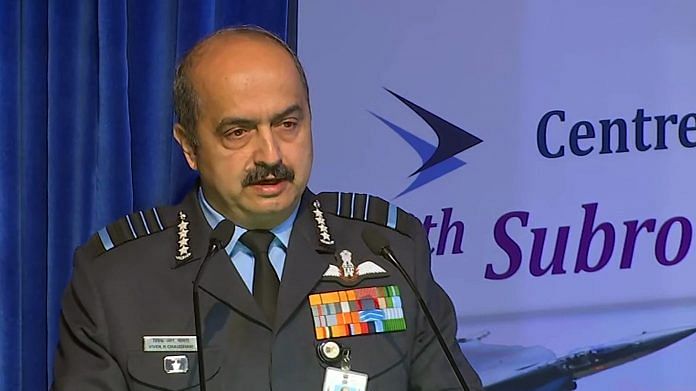New Delhi: Noting that not a single service – Army, Navy or Air Force – can win wars on its own, Indian Air Force Chief V R Chaudhari Thursday stressed on the need for ‘jointness’ of services.
However, Air Chief Marshal (ACM) Chaudhari made it clear that primacy of who will do what cannot be determined by pro rata systems of who has larger mass of forces and equipment.
The IAF chief’s comments come at a time when the country is in the process of moving towards theatre commands and jointness to fight future wars.
The ACM also made it clear that China’s demonstration last month of physically moving one of its disabled satellites into the graveyard orbit is bringing in a new threat in the race to weaponise space – a domain considered to be relatively safe.
Speaking on the future of wars, the IAF chief, who was addressing a seminar organised by the think tank Centre for Air Power Studies (CAPS), said control of airspace has become a prerequisite for conduct of operations at all levels.
ACM Chaudhari said that the challenge is to develop doctrines, training philosophy and concept of operations.
Also read: Northern Army Commander visits Galwan, Army tweets rare pictures with tricolour
‘Guiding principles cannot be dated’
The air chief said that there is a need for doctrines to be contemporary because “if the fundamental guiding principles are dated, then our war fighting will also be dated”.
Doctrine is an important development of future force structures and capability requirements which will require dedicated and specialised training, he said.
He stressed on the need for training philosophy to be modern, flexible and adaptive “with a heavy dose of jointness”.
He said the next step will be to use own doctrine and well-trained manpower to evolve employment philosophy and concepts.
“This will require joint planning and joint execution of plans. No single service can win war on its own and this holds true for the future. Primacy of who will do what cannot be determined by pro rata systems of who has larger mass of forces and equipment. This thought process must change and it will be important to appreciate the capability of each service to make 2+2 = 5,” he said.
There is a need for us to develop joint command and control structures for integrated and synergised application of combat power, he added.
IAF chief Chaudhari said the fundamental strength of individual services must be brought together to deter potential enemies and decisively win the nation’s war.
“There is a need to wage tomorrow’s war with pragmatism and not necessarily idealism,” he said.
His statement comes at a time when sections of the Indian defence establishment feel that the proposed theatre commands are largely Army-oriented and may not be best suited for future wars.
The IAF has in the past openly opposed the distribution of its air assets into various theatres and air force being seen as just a “support arm” by late Chief of Defence Staff Gen Bipin Rawat.
The IAF is of the opinion that while jointness is the key way forward, there should be one theatre – India theatre – rather than multiple ones with their assets divided.
As per the original plan, India is supposed to have five joint commands, three of which will be led by the Army.
Also read: India’s new Maritime Security Coordinator is 22 years too late. But it ticks many boxes
Threat from ‘innocuous email or PDF document’
Air Chief Marshal Chaudhari highlighted that the nature of information dominance has made “data and information the new weapon”.
“Targeting critical information infrastructure and distributed denial of services has changed the way war would manifest. Aerial and space based assets have now become a single entity, bound by a common network and therefore also vulnerable to attacks,” he said.
Chaudhari added that while traditional land, sea and aerial warfare will always take place, unconventional and hybrid means to disrupt conventional capabilities will need to be countered.
“Today a seemingly innocuous email or PDF document has the capability to wipe out entire databases or corrupt systems creating widespread chaos or confusion. This in my view is the new manifestation of what we traditionally called shaping the battlefield,” he said.
Need for ‘all of nation approach’
The ACM underlined the challenge that air power will face from technology and the need to keep pace with it.
No other field has seen such rapid transformation of technology as air power has seen in the last 120 years of its existence, he said.
“Technology in its domain is niche, propriety and often state controlled, therefore the associated challenge is to develop capability for indigenous design and development and production of future capability.
“There is a need for an ‘all of nation approach’ because no single entity will have the capability and knowledge to develop future battle-ready systems,” Chaudhari said.
(Edited by Monami Gogoi)
Also read: Killing gunmen easy, Kashmir’s ‘white collar terrorists’ a threat, says Army’s Chinar Corps chief



